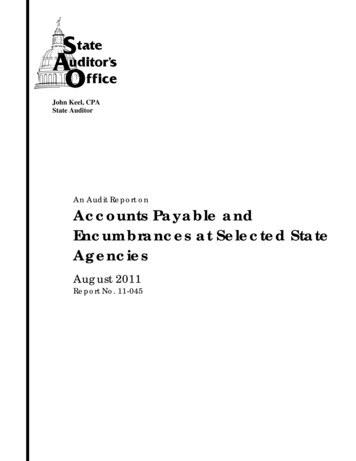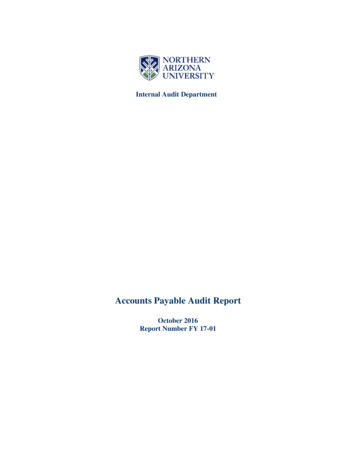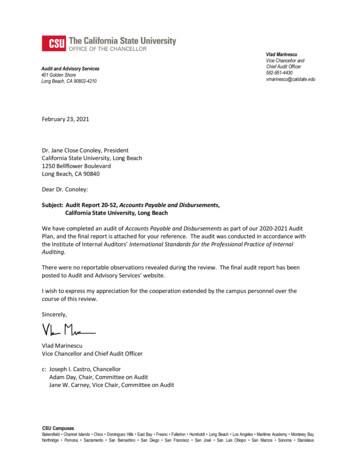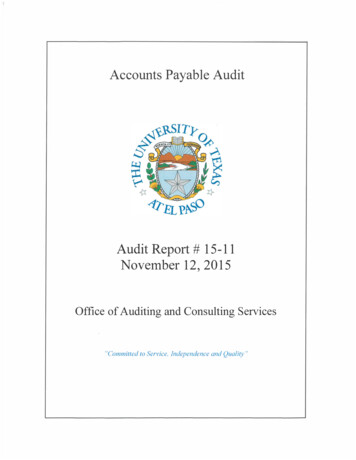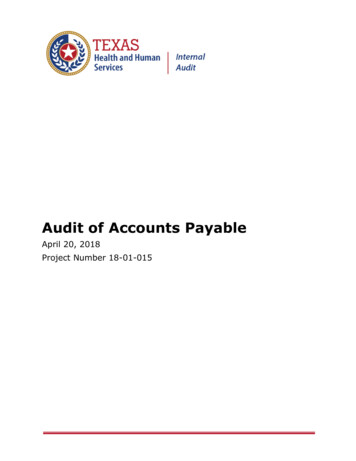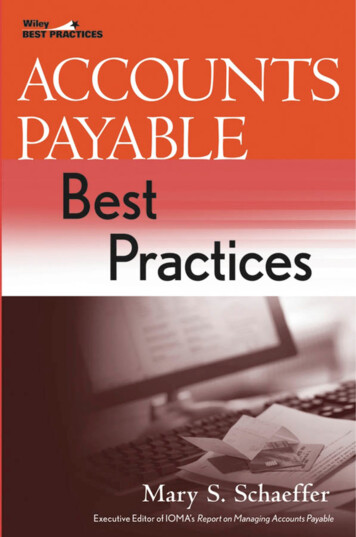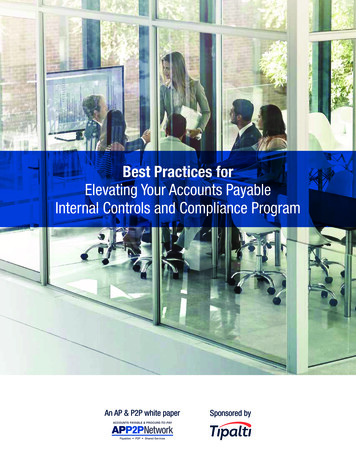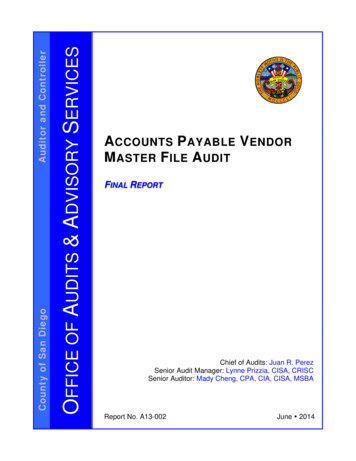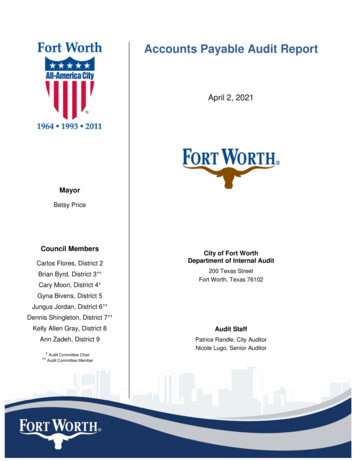
Transcription
Accounts Payable Audit ReportApril 2, 2021MayorBetsy PriceCouncil MembersCarlos Flores, District 2Brian Byrd, District 3 Cary Moon, District 4 City of Fort WorthDepartment of Internal Audit200 Texas StreetFort Worth, Texas 76102Gyna Bivens, District 5Jungus Jordan, District 6 Dennis Shingleton, District 7 Kelly Allen Gray, District 8Audit StaffAnn Zadeh, District 9Patrice Randle, City AuditorNicole Lugo, Senior Auditor Audit Committee ChairAudit Committee Member
Executive SummaryThe Accounts Payable Audit wasconductedaspartoftheDepartment of Internal Audit’sFiscal Year 2020 Annual AuditPlan.As part of the Fiscal Year 2020 Annual Audit Plan, the Department ofInternal Audit conducted an Accounts Payable Audit. Based on ouraudit results, internal controls governing the security of the City’saccounts payable process, including ACHs, were adequate.Audit ObjectivesThe Financial Management Services (FMS) Department hasimplemented policies and procedures to help ensure that City paymentsare made to legitimate businesses. The FMS Department has alsoenhanced its ACH process to ensure proper controls over the electronicsubmittal of vendor payments.The objectives of this audit were to: evaluateinternalcontrolsgoverning the security of the City’saccounts payable/ACH process; evaluate the City’s process fortaking advantage of early paymentdiscounts; identify the time lag betweenvendor invoice dates, receipt ofgoods and/or services and Citypayments; ensure that payments wereadequately supported; and, determinewhetheruserdepartments conducted qualitycontrol audits as required.Audit ScopeOur audit included a review ofaccounts payable transactions for theperiod October 1, 2019 throughSeptember 30, 2020.Opportunities for ImprovementTake advantage of early paymentdiscountsExisting policies and procedures help ensure that vendor invoices areadequately supported, accurate and paid in a timely manner. Also,departments are required to conduct monthly quality control audits toverify, on a sample basis, that vendor payments are accurate andadequately supported.A majority of City vendor payments were made within 30 days of thevendor’s invoice date. However, the City did not always take advantageof early payment discounts. For example, the City sometimes madevendor payments within the early payment discount period, but did notapply the discount towards the vendor’s gross invoice amount. In otherinstances, the City did not pay vendor invoices within the early paymentdiscount period.In FY2020, the City applied early payment discounts (totaling 2,783.46) to 83 of 206 randomly sampled vendor invoices. However,the City did not take discounts on the remaining 123 invoices. As aresult, 4,512.77 in discounts were either not taken or were missed. Thisaudit finding is discussed in further detail within the Detailed AuditFinding section of this report.
Table of ContentsBackground . 1Objectives . 6Scope . 6Methodology . 6Audit Results. 8Overall Risk Evaluation . 11Detailed Audit Finding . 12Acknowledgements . 16
BackgroundThe City of Fort Worth remits payments to City vendors via Automated Clearing House (ACH), wiretransfers, paper checks and procurement cards. City contracts state that the City agrees to pay all invoicesfor accepted work within 30 days of receiving the invoices, and that the City will only pay for work that iscompleted in accordance with the terms and specifications contained in the contractual agreements.As noted in the following chart, the City remits the majority of its vendor payments via ACH. In FY2018,the City of Fort Worth was victim to an ACH scam. Upon receipt of fraudulent documentation, CityAccounts Payable staff changed the bank account number that the City had on file (for a particular vendor)to a bank account number referenced in the fraudulent documentation. As a result, a City payment waselectronically deposited into to a bank account that belonged to someone other than the intendedvendor. The City promptly modified its procedures to adequately address control weaknesses within theACH process.The City Paid Over 1.6B to Vendors During Fiscal Year 2020Source: PeopleSoft FinancialsAccounts Payable AuditAudit Project #2020.020Page 1
The City of Fort Worth uses a three-way matching procedure to help ensure that vendor payments areaccurate. Before a vendor payment is processed, the three-way matching procedure (which is a bestpractice) identifies a “match” of the purchase order, receipt of goods and/or services and the vendor invoice.The City’s accounts payable function is decentralized, and requires coordination among user departmentsand the Financial Management Services (FMS) Department. User departments are responsible for ordering goods/services, managing vendor contracts, creatingpayment vouchers, reviewing payment vouchers for accuracy, properly receiving authorizedgoods/services and providing supporting documentation (within PeopleSoft) to the Central AccountsPayable service area of the Treasury Division (within the FMS Department). Central Accounts Payable is responsible for verifying that vendor disbursements are payable to thecorrect vendor, addressed to the correct remit-to address, and in the correct amount. In addition, CentralAccounts Payable is responsible for ensuring that vendor invoice numbers and invoice dates wereentered accurately in PeopleSoft. Duties required to process accounts payable transactions are adequately segregated. For example, Citydepartments do not issue vendor payments. Instead, Central Accounts Payable is responsible for issuingvendor payments for all departments. In addition, invoices paid by wire transfer are processed andmade through the Cash Management section of the Treasury Division, and are entered and recorded inPeopleSoft by authorized Central Accounts Payable staff. The Purchasing Division of the FMS Department generally procures goods and services on behalf ofCity departments. The Purchasing Division helps ensure compliance with City policy and applicableprocurement law. Vendor management staff, within the Purchasing Division, verify vendor registrations and accountchanges. Since the Information Technology Solutions Department is responsible for the City’s network andcomputer system, the Chief Technology Officer is responsible for approving all information technologyprocurements that will connect to the City’s network, before the information technology assets arepurchased.Accounts Payable AuditAudit Project #2020.020Page 2
Source: City of Fort Worth IntranetOn January 29, 2019, the Mayor and City Council authorized an agreement (M&C P-12292/City SecretaryContract #51829) with Carahsoft Technology Corporation for software, training, services and support foran accounts payable invoice processing solution, Automated Invoice Management (AIM). The FMSDepartment indicated that the AIM solution would further enhance invoice payment efficiencies throughthe use of advanced optical character recognition, and by centralizing the electronic receipt of vendorinvoices directly in Central Accounts Payable. Centralizing the electronic receipt of vendor invoices allowsfor enhanced monitoring by Central Accounts Payable. For example, when using the decentralizedaccounts payable process, invoices were not visible (to Central Accounts Payable) until the invoices werekeyed into PeopleSoft by user departments. An illustration of the payment process, via the AIM solution,is as follows.Accounts Payable AuditAudit Project #2020.020Page 3
Automated Invoice Management (AIM) SolutionSource: Financial Management ServicesThe AIM solution converts electronic vendor invoice images to machine readable text, extracts invoiceinformation, populates an invoice template, then systematically attempts three-way matching (i.e., matchingthe invoice to the purchase order and the receipt of goods and/or services). Once the three-way match isaccomplished, the AIM solution systematically transitions the invoice to PeopleSoft. A payment voucheris then automatically created for processing by Central Accounts Payable.In October 2019, the FMS and Information Technology Solutions Departments were the first twodepartments to go live with the AIM solution. The original plan was to implement the solution across allCity departments, in six phases, by August 2021. However, implementation delays resulted fromoperational impacts associated with the City’s COVID-19 response. The implementation schedule was,therefore, compressed into five phases (as depicted in the following chart). Internal Audit was informedthat the City’s compressed implementation plan should still allow completion by the initial targetimplementation date (August 2021), barring any unforeseen setbacks.Accounts Payable AuditAudit Project #2020.020Page 4
Source: Financial Management Services DepartmentThe FMS Department stated that construction invoices, with retainage withheld, are excluded from theCFW’s AIM implementation plan. They also indicated that customer refunds resulting from programcancellations and/or citizen overpayments are also excluded from the City’s AIM implementation plan. The FMS Department indicated that during the design of the AIM solution, the City’s Capital Deliveryteam (consisting of project management staff from various departments) was in the process of exploringa specialized project management and approval work flow system to more efficiently process therouting of construction invoices with retainage withheld. Customer refunds, such as Municipal Court bond refunds (generated from the Municipal Courtsoftware) and facility rental customer refunds (generated from the Park and Recreation software) aregenerally payable to one-time vendors (e.g., vendors who are not assigned a unique vendor i.d. withinPeopleSoft).The FMS Department stated that the City processes more than 70,000 invoices annually, and that themajority of the City’s invoices (80% - 90%) should be processed through the AIM solution, once AIM isfully implemented. Additionally, the AIM solution should reduce manual invoice data entry throughoutthe City, for invoices processed through AIM.In addition to improving the ACH process and centralizing CFW accounts payable, the FMS Departmenthas taken additional measures to help ensure accounts payable accuracy and efficiency. On February 1,2020, the FMS Department introduced an Administrative Regulation (General Accounts PayableGuidelines) as guidance to help reduce/eliminate vendor payment challenges such as duplicate payments,payment of exempted sales taxes, etc. These guidelines require that each department conduct monthlyquality control audits of at least 2% of the monthly invoice vouchers processed by their departments.Accounts Payable AuditAudit Project #2020.020Page 5
ObjectivesThe objectives of this audit were to: evaluate internal controls governing the security of the City’s accounts payable process, includingACHs; evaluate the City’s process for taking advantage of early payment discounts; identify the time lag between vendor invoice dates, receipt of goods and/or services and City payments; ensure that payments were adequately supported; and, determine whether user departments conducted quality control audits, as required by City policy.ScopeOur audit included a review of accounts payable transactions from October 1, 2019 through September 30,2020.Since Internal Audit routinely conducts wire transfer, city-wide procurement card and duplicate paymentreviews, this audit did not include a review of those procurement methods. Additionally, this audit did notinclude a review of the AIM solution, which will be considered for a subsequent audit.MethodologyTo achieve the audit objectives, the Department of Internal Audit performed the following: interviewed FMS Department staff, including the Purchasing Division; reviewed applicable City policy and state regulations; ensured validity of vendors and adequacy of documentation supporting vendor invoices; reviewed and analyzed vendor bid responses, contracts and invoices; identified time lag between vendor invoice dates, receipt of goods and/or services and Citypayments; consulted user departments to obtain reasons for vendor payment delays; verified the three-way match; determined whether early payment discounts were taken, when applicable; evaluated the overall accounts payable process; reviewed departmental quality control audits; and, evaluated internal controls related to accounts payable activities.Accounts Payable AuditAudit Project #2020.020Page 6
We conducted this performance audit in accordance with generally accepted government auditingstandards. Those standards require that we plan and perform the audit to obtain sufficient, appropriateevidence to provide a reasonable basis for our findings and conclusions based on our audit objectives. Webelieve that the evidence obtained provides a reasonable basis for our findings and conclusions based onour audit objectives.Chapter XXVIII of the Fort Worth City Charter established the CFW’s Department of Internal Auditindependent of management, reporting directly to the Fort Worth City Council. We utilized the Committeeof Sponsoring Organizations of the Treadway Commission (COSO) framework when evaluating internalcontrols.The following internal control components and corresponding principles were considered significant to theaudit objectives. COSO is dedicated to providing thought leadership through the development offrameworks and guidance on enterprise risk management, internal control and fraud deterrence.Internal rial oversight, integrity, ethics and responsibility; staff recruitment,development, retention, performance and accountabilityControl ActivitiesPolicies, procedures and systemsRisk AssessmentClearly-defined objectives to identify risks, define risk tolerances, and implementnecessary controls (e.g., written policies and procedures)Information andCommunicationCommunication of necessary quality informationMonitoringMonitoring and evaluating the effectiveness of internal controls.Accounts Payable AuditAudit Project #2020.020Page 7
Audit ResultsWe concluded that the FMS Department established policies and procedures to help ensure the security ofpayments made to City vendors (e.g., via ACH and check). The FMS Department also implemented citywide policies to help ensure that vendor payments were accurate. Based on our test results, documentationsupporting vendor payments was adequate and FMS procedures ensured that accounts payable paymentswere made to legitimate vendors.FMS sent routine reports to departments, to provide an idea of how departments were performing in termsof payment timeliness. Departments were also informed of noncompliance with monthly quality controlaudit requirements, incomplete documents and/or other errors that would have caused vendor paymentdelays.Based on our review of the modified ACH process (which is documented in the FMS Department’s policiesand procedures), controls were put into place to prevent the reoccurrence of a similar scam previouslymentioned in the Background section of this report. Additionally, based on our test results, the CentralAccounts Payable service area staff complied with those modified ACH procedures. Vendor bank accountchanges made during our audit period were proper, adequately supported, and legitimately requested fromthe vendor.Monthly Departmental Quality Control Self AuditsSection 7.24 of the Financial Management Services Administrative Regulation for General AccountsPayable requires that departments conduct monthly self audits of at least 2% of the prior month volume ofvendor invoice vouchers. Although some departmental quality control self audits were submitted after thedue date, we noted that late departmental submissions declined since the requirement was implemented inMarch 2020. In reference to quality control audits between March 2020 and June 2020: 60 were submitted to the FMS Department by the due date;34 were submitted to the FMS Department after the due date; and,two (2) were not performed.In reference to the two self audits that were not performed, the FMS Department determined that the nonsubmitting department had no accounts payable transactions during those two reporting periods. The FMSDepartment further indicated that City departments would be informed that emails would be required (inthe future) to confirm that no invoices were paid during the reporting periods.Accounts Payable AuditAudit Project #2020.020Page 8
Source: Financial Management Services Department filesVendor Payment Time LagInternal Audit randomly selected 52 vendor payments for testing, which resulted in a total of 118 vendorinvoices. Based on City departmental date stamps and/or vendor invoice receipt dates documented withinPeopleSoft, all but three of the 118 vendor invoices were noted as being received within 30 days of thevendor invoice date.Of the 118 vendor invoices, City payments were made within these four ranges of days from the vendorinvoice dates: 98 invoices (83.1%) were paid within one to 30 days; 11 invoices (9.3%) were paid within 31 to 60 days; Five invoices (4.2%) were paid within 61 to 90 days; and, Four invoices (3.4%) were paid beyond 90 days.Three of the 118 vendor invoices were from Minority Business Enterprise (MBE) vendors. Of those threeMBE vendors, one was paid within one day of the invoice date. A second MBE vendor was paid 28 daysafter the vendor’s invoice date, and 28 days after the invoice was date-stamped by the procuring department(i.e., the vendor’s invoice date and the procuring department’s date stamp were the same). The third MBEvendor was paid 39 days after the invoice date, but only eight days after the invoice was date-stamped bythe department.To increase the audit coverage of payments made to MBE vendors, Internal Audit identified vendors whowere noted as MBEs within PeopleSoft. We then randomly selected 45 CFW payments to those MBEvendors, which resulted in a total of 77 invoices. Based on our review, a majority (70.1%) of the 77 MBEinvoices were paid within 30 days of the invoice date. Of the 77 vendor invoices, payments were madewithin these four ranges of days from the vendor invoice dates: 54 invoices (70.1%) were paid within one to 30 days; 14 invoices (18.2%) were paid within 31 to 60 days; Five invoices (6.5%) were paid within 61 to 90 days; and, Four invoices (5.2%) were paid beyond 90 days.Accounts Payable AuditAudit Project #2020.020Page 9
All but eight of the 77 vendor invoices were noted as being received (by the City) within 30 days of thevendor invoice date (based on City departmental date stamps, or vendor invoice receipt dates documentedwithin PeopleSoft). It should be noted that one of the invoices paid withi
Apr 02, 2021 · Accounts Payable staff changed the bank account number that the City had on file (for a particular vendor ) . quality control audits of at least 2% of the monthly invoice vouchers processed by their departmen
